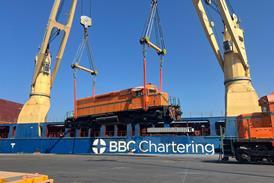Brazilian oil and gas company Petrobras has signed an agreement with the port of Açu to provide support to the decommissioning of oil and gas platforms.

The agreement allows for platforms undergoing decommissioning to be temporarily docked at Açu until the final destination of the unit has been decided, in accordance with best international practice on green recycling and sustainability (ASG). The contract with the port, which is located in the city of São João da Barra, runs for three years and also covers support services to the units, electricity supplies, etc. The agreement is part of Petrobras’s plan to decommission a total of 26 platforms by 2030.
Petrobras has set aside USD9.8 billion for its decommissioning activities, according to its 2023-2027 strategic plan.
The oil and gas industry has been active in recent years and there is a backlog of projects, creating plenty of work for Brazil’s project logistics and heavy lift specialists. In late May, Petrobras obtained authorisation from the National Agency of Petroleum, Natural Gas and Biofuels (ANP) to resume production of six more facilities located in the fields of Taquipe, Buracica, Fazenda Alvorada, Rio do Bu and Cidade de Entre Rios in the Bahia Terra Hu
Further still, Petrobras has a new president, João Paulo Prates. A former politician, he was selected by Brazilian president Luiz Inácio Lula da Silva (generally referred to as Lula) and has announced that the company will no longer follow international diesel/fuel prices.
Prates has said that Petrobras will invest in: offshore wind power in the north of Brazil; switching to environment friendly sources; the production of biofuels and nitrogen at all refineries; being a partner in offshore plans outside Brazil; and drilling in the Amazon, subject to environmental evaluation. All this will require Petrobras to make significant investments, although those interviewed in our recent Brazil market report, published in our July/August 2023 edition, were sceptical as to how this could be achieved.
















